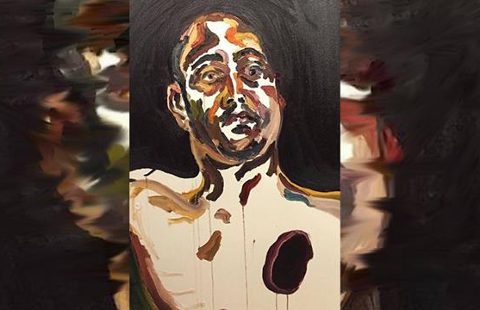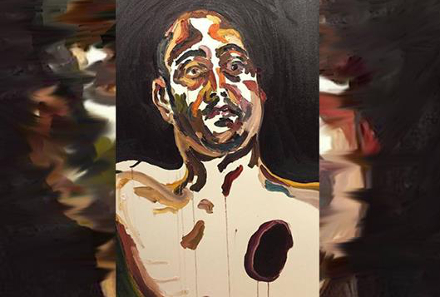Indonesia President Joko Widodo shows a clear lack of compassion when it comes to foreign drug smugglers on death row. But Australia’s same hard heartedness hasn’t helped the case at all, writes James Giggacher.
As convicted Australian drug smuggler Myuran Sukumaran faces the last few moments of life he has been granted a final wish; to paint for as long as he can before he is taken away to be executed.
He, fellow Australian Andrew Chan, and six other foreigners from Brazil, Ghana, Nigeria and the Philippines, plus one Indonesian, will most likely be dead soon, having all been tied to poles and shot through the heart by a firing squad for their drug-related crimes.
As loud and sustained as the Australian and international protests have been, we could not have expected any other end. After all, drug peddling is a sin against Indonesian society that President Joko ‘Jokowi’ Widodo. cannot countenance. He has repeatedly said it must be met with the harshest of responses – no matter how discredited the data he uses to highlight Indonesia’s so-called drug emergency, and inconsistent his approach to death row sentencing.
Sukumaran’s last request is a fitting one; it is through his painting and close friendship with celebrated artist Ben Quilty that he has helped walk an amazing path to reform. But even though the possibility of a blank canvass exists in a man who once lost his way, redemption has been cruelly denied. The paint has dried; it’s time to hang.
After the smoke from rifles clears, all that will be left to do is reflect on what has happened, ask how we got here and what the whole sorry saga says about civilised 21st-century democracies and societies. For Indonesia, and Jokowi in particular, it’s hard to see them coming out of this looking anything but ugly.
There’s a certain damned if you do, be damned you won’t about Jokowi’s hypocritical approach to executions; the President pursuing clemency for Indonesians overseas on death row while at the same time condemning more foreigners to that same fate in just four months than have been executed in Indonesia over the previous 16 years.
Before Widodo’s administration, only seven of the 27 people executed were foreigners. Sukumaran, Chan and their fellow seven death row detainees, now eking out their last moments on the prison-island Nusakambangan, will bring the total amount of foreigners killed in his short term to 13 – five having already been executed this January.
There’s also the constant taint of corruption. In Australia, recent revelations by a defence lawyer of a supposed request of $130,000 by judges to secure a lesser sentence for Chan and Sukumaran have given renewed impetus to have the whole case re-examined. But while Australian Foreign Minister Julie Bishop has labelled it a “global issue”, calls for an investigation seem hardly likely, with Jokowi stating the issue should have been raised earlier.
Late today, Indonesia’s judicial commission announced that it had completed an investigation into the claims, without interviewing any witnesses or delivering any findings.
Then there are the arguments about the futility of the death penalty as a deterrent. As Australian lawyer Greg Barns, writing in Policy Forum, notes:
“The disastrous policy of prohibition means that the risk reward equation for citizens in Asian countries, including Australia, is always skewed in favour of risk. No amount of policing or threats of draconian penalties will deter a participant in a market where the profit margins are so high courtesy of prohibition.”
Despite all the mounting evidence against his position, the President insists that the show must go on. It paints a worrying picture. Here is one of the world’s largest democracies, a nation that has made great strides since its retreat from military rule in 1998, insisting on a form of punishment that Australia abolished in 1967. By the following decade, only 15 other nations had dispensed of the punishment. Today, 140 countries, almost two-thirds globally, no longer use it.
Unfortunately it’s not just Jokowi who is clamouring for the ultimate punishment; he has the broad support of his people. The question then has to be asked; is this really a marker of a humane, just and progressive society?
Regardless of how the Indonesian people feel, the President still has the power to exercise discretion and show mercy, even at this midnight hour; all with the simple stroke of the pen. But he flatly refuses, sticking to his guns, and making good on his promise to ignore all bids for clemency instead of considering them on a case-by-case basis; as he is meant to under the International Convention of Civil and Political Rights which Indonesia signed up to in 2006.
On Monday, two law experts from ANU, publicly released advice provided to Chan and Sukumaran’s legal team which called the executions into question, labelling Indonesia’s death penalty stance as illegal under international law– an assertion confirmed in an earlier statement released by UN Secretary General Ban Ki-moon.
“As a signatory to the International Covenant on Civil and Political Rights, Indonesia may only impose the death penalty for the ‘most serious crimes’. International law does not recognise drug trafficking as meeting this threshold,” says the report co-author Donald Rothwell.
“Indonesia must uphold the international legal obligations it has agreed to. These obligations are especially owed to those countries whose nationals are listed for execution including Australia and those other countries whose citizens are on death row including Brazil, France and the Philippines.”
An appeal to international law seems like a desperate last roll of the dice. But when there is nothing left to lose, why not play for broke?
But here’s the rub, the final twist of the knife, and where, in the case of Chan and Sukumaran, the efforts by the Foreign Minister Julie Bishop and Prime Minister Tony Abbott to put enough pressure on Jokowi to reconsider his stance come undone.
Forget the threats over aid and ambassadors; in the past, and again over the last few days, Australia has called upon Indonesia’s sense of civilisation and place in international society, as well as the evidence of Chan and Sukumaran’s reform and right to a second chance.
But when the United Nations also calls you out on the inhumane treatment of refugees, it makes it hard to win an argument based on the values of civilisation. It’s a pot calling the kettle black moment brewing. Particularly when turning back the boats is Australia’s national drug emergency.
That isn’t to say that Jokowi would listen to such reasoning anyway. Certainly, domestic pressures seem to be his main motivator at the moment. However, if playing the international obligations card it’s a damn smart move to try and stack the deck first, making sure your own international record isn’t as tarnished.
And for a nation with all the post-colonial hang ups of Indonesia, the porous territorial integrity that only 17,000-plus islands can bring, and the gnashing of teeth at the first hint of ‘threats to sovereignty’, you should be damned sure to do as I do, not as I say, when trying to win a tough argument, let alone save a few lives.
Back on Nusakambangan, one of the last self-portraits painted by Sukumaran depicts the grisly scene of his own death. The powerful, yet graphic image, has him on a black background, a gaping hole in his chest, where the bullets which kill him will enter his body.
Perhaps if both countries’ leaders showed greater compassion and weren’t so hard hearted on the policy issues and challenges that matter to them most, Sukumaran’s own heart wouldn’t be the subject of such a graphic final portrait; nor the final resting place of a bullet.
UPDATE: Mary Jane Veloso was given a last-minute, temporary reprieve by Indonesian authorities in the early hours of Wednesday morning. The number of foreigners now killed during Jokowi’s presidency now stands at 12; five more than killed in the 16 years prior to his election.
James Giggacher is editor and associate lecturer at the The Australian National University’s Coral Bell School of Asia Pacific Affairs, and has covered Indonesia politics for New Mandala.
 Facebook
Facebook  Twitter
Twitter  Soundcloud
Soundcloud  Youtube
Youtube  Rss
Rss 
